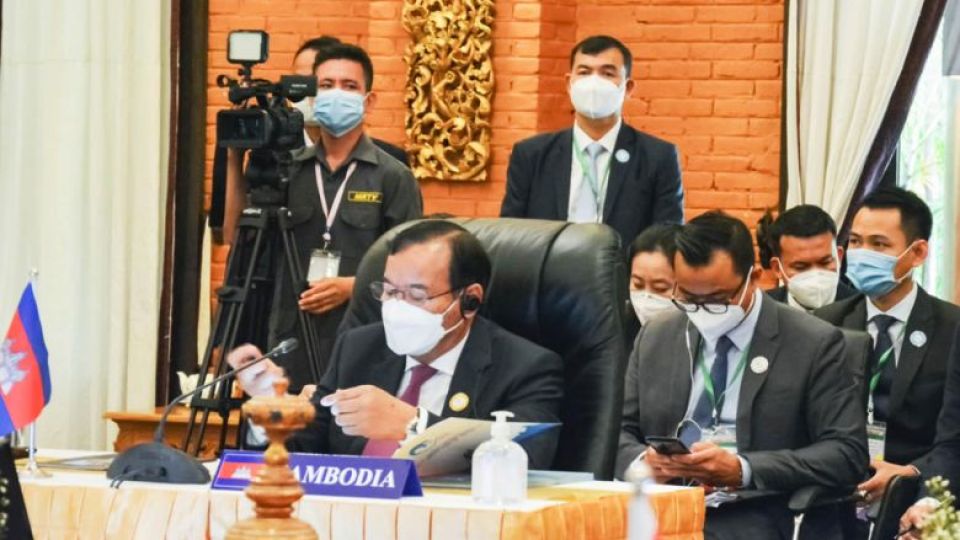July 7, 2022
PHNOM PENH – Minister of Foreign Affairs and International Cooperation Prak Sokhonn, in his capacity as the ASEAN special envoy on Myanmar, said his second trip to the crisis-hit country was “somewhat fruitful”, while cautioning that he has no “divine medicine” for Myanmar’s crisis.
Sokhonn made the remarks following his June 29-July 3 visit, which was capped off by the separate Mekong-Lancang Cooperation (MLC) Foreign Ministers’ Meeting, held there on July 4.
Sokhonn briefed an audience of journalists and foreign diplomats upon his return to Phnom Penh on July 6 regarding the results of his second trip, which he said had been “somewhat fruitful”.
Sokhonn said leaders of Myanmar’s ruling State Administration Council (SAC) had hinted that they may be willing to accept some opposition members if they were to cease fighting, but only under certain conditions.
“The SAC’s main condition is that the opposition groups have to change their mindsets, and that consists of three elements. First, they can’t continue to attempt to destroy the government if they are going to join it. Second, they aren’t going to be replacing the government. And third is that the 2008 constitution must be the basis for peace talks,” Sokhonn said, adding that these conditions were set by SAC chairman Senior General Min Aung Hlaing, whom he met for over two hours on this trip.
“Although there are conditions attached, I think that at least we have paved the way for the start of negotiations. The wheels are back on for peace talks so now they can roll forward. But whatever is possible will depend on all of the sides in the conflict in Myanmar. But at least the door is open – whether they want to enter or not, it depends on them, like we said earlier,” he said.
Sokhonnn elaborated on various aspects of his visit, including the issue of humanitarian assistance to Myanmar, which he reiterated should be provided to all of the people there without discrimination.
He said he was told that his latest request to meet with former civilian leader Aung San Suu Kyi was denied by the SAC, who cited “judicial procedures” as their reason.
Sokhonn also mentioned that his request to meet with another opposition figure – Su Su Lwin, former Myanmar First Lady and founding member of the now-dissolved National League for Democracy (NLD) previously led by Suu Kyi – was also denied, with the SAC in this case saying it was due to her poor health.
“The SAC has shown me reports of violence being committed by armed groups made up of former civilians, such as beheadings and the amputation of limbs, along with other killings, bombings and murders. If this continues, it will just create a circle of revenge and threats without end,” he said, citing SAC’s claims of extreme violence by their opponents including the burning of entire villages.
“I also condemn the killing of teachers committed by the ‘civilian army’ to show the opposition movement’s defiance towards the SAC – that is, if such cases have really happened as I was told,” he said, in reference to the fact that the incidents described by the SAC have not been independently confirmed or widely reported on to date.
He said that following his meetings with opposition leaders and foreign diplomats stationed there, he concluded that the rival groups – especially the armed civilian insurgents – are at least partly responsible for the ongoing violence, including destruction of public property and the killings of civil servants such as teachers and health officials who were working voluntarily to respond to the public’s needs in the middle of a crisis by educating children and helping fight Covid-19.
He said that the cessation of violence can only be achieved through the participation of all stakeholders in the conflict. All the groups he met had said they were concerned about the violence, threats and fear which is haunting all of the non-combatants in the regions they control.
One basic principle that all of the stakeholders could agree on was the urgent need for further assistance to Myanmar to find peace, preferably through a process of inclusive dialogue, he noted.
“Although I was moved by these frank requests and I personally feel motivated to act, nevertheless I have to accept that such expectations are beyond the mandate of the ASEAN special envoy.
“I told the armed groups that ASEAN is just a coordinator or facilitator and cannot be a director or further involved as a party to the Myanmar conflict, which can only be solved by Myanmar through Myanmar-owned and Myanmar-led strategies.
“I have fewer than six months left in my mandate and I should say that I don’t have a divine medicine to resolve the Myanmar crisis. I am not a magician. To be honest, what ASEAN and myself can accomplish is to facilitate the peace process by promoting inclusive dialogue acceptable by all sides.
“What we can do is to help stop the violence and remind all sides not to push their country further to the brink by fanning the flames of civil war, which could trigger regional security and stability crises, but would especially be a tragedy for Myanmar’s people,” he said.
Sokhonn said ASEAN will try its best to help Myanmar as long as the bloc maintains its solidarity in doing so – a prospect he was optimistic about given the depth of commitment shown by ASEAN member states so far, no matter how much pressure has been brought to bear on them.


